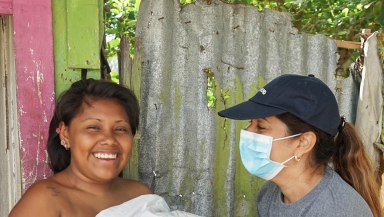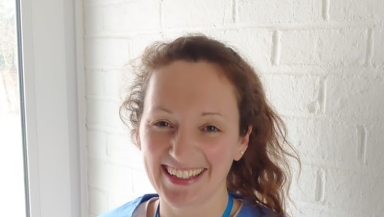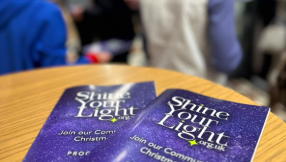
"As I look into the eyes of the people I am vaccinating against Covid-19 every day, I feel hopeful for the future. With every person walking out of my clinic, I sense us edging ever closer. But I know it's going to take so much more than this for our world to be rid of this pandemic for good."
Scot Maggie McColl is donning her scrubs and returning to nursing after several years away from her vocation.
Unable to sit back and do nothing when coronavirus hit the UK last year and the NHS became stretched, Maggie, originally from Dunblane, knew she was in a position to assist. She got herself back on the nursing register because she is passionate about doing everything she can to respond.
Yet as the 35-year-old prepares to head up a vaccination centre later this month, she is acutely aware that for millions of people in low-income countries, there is no hope in sight for an end to the pandemic.
For the past five years, Maggie has worked for international development charity Tearfund, where she has witnessed first-hand the challenges many people around the world face as a result of extreme poverty, making the realities of Covid-19 even more problematic in communities without basic healthcare or access to clean water.
And she worries about the toll Covid-19 is taking on the very poorest people in our world, for whom there is no roadmap out of the current situation.
Maggie says, "Millions of people in the UK have now received at least one dose of a Covid-19 vaccine, and this is great, but it is estimated that most lower-income countries will only be able to vaccinate one in ten people in 2021, and that millions of people will have to wait until at least 2022 for a vaccination.
"We can all relate to having to wait for a vaccine to become available, but could you imagine now that this glimmer of hope exists, if you were living in a country where you didn't have access to this for another year? It is desperately sad that there is such a huge divide between countries who can afford the vaccine to protect their population, and those who are being left behind."
Maggie's work over recent years with Tearfund has allowed her to meet families living in the poorest communities in Malawi, Ethiopia, Rwanda, Cambodia, India and Nicaragua. And now, moved by what she has seen, Maggie feels strongly about Tearfund's calls for equal access to treatment and vaccines for people living in these poor countries who can't afford them.
She says, "I am proud to be playing my part in the NHS, but I can't just pretend there isn't this great injustice between the people I am vaccinating here in the UK, and those around the world who also need to be protected and kept safe from this deadly virus.

"People in Malawi are every bit as concerned for their elderly relatives and those with underlying health conditions as we are, but the truth is they are much further from a resolution to all this, and they are living in conditions which pose considerable risk. It isn't as easy for everyone to be able to wash their hands in clean water, or have a face mask to hand, or have a healthy, nutritious diet to keep them strong.
"Tearfund is right at the heart of these communities supporting those who are most vulnerable. Our partners have been working on the ground to improve hygiene and sanitation, and also convey public health messages to help prevent the spread of coronavirus.
"But more needs to be done to support the recovery beyond our own borders. The only way out of this pandemic is to recover together – no country is safe until all countries are safe."
Tearfund is part of The People's Vaccine Alliance, a growing movement of health and humanitarian organisations, world leaders, health experts, faith leaders and economists urging that everyone in every country should have fair and free access to a tested Covid-19 vaccine, free of charge.
The campaign highlights that rich countries have enough doses to vaccinate everyone nearly three times, whilst poor countries don't have enough to even reach health workers and people at risk. Unless something changes dramatically, billions of people around the world will not receive a safe and effective vaccine for years.
Organisations backing this movement are calling on governments to ensure that pharmaceutical and research institutions working on a vaccine share science, technological know-how, and intellectual property so enough safe and effective vaccines can be produced.
So far, all of Moderna's doses and 96 percent of Pfizer/BioNTech's have been acquired by rich countries.
In welcome contrast, Oxford/AstraZeneca has pledged to provide 64 percent of their doses to people in developing nations. Yet despite their actions to scale up supply, they can still only reach 18 per cent of the world's population next year at most.
Maggie was inspired to enter nursing following the support she received from a nurse in the Royal Hospital for Sick Children, Edinburgh, when she was 16-years-old and faced with the sight of her younger sister on a ventilator in intensive care.
She explained, "Ever since that moment I have known that, as a nurse, your role is to care for and ease the fears of those you meet. Like that nurse did for me. I can do that here and I am really glad to be back in the NHS, making a tangible difference in the midst of this pandemic. This vaccine will allay fears and save lives.
"I am reminded daily that being offered a safe, free, life-saving vaccine means we are truly privileged. But I firmly believe that neither poverty nor country of residence should be a barrier to getting this.
"As I spend my days giving the jab to people here at Queen Mary's Hospital, Roehampton, I would definitely like to think that those in other parts of the world are not facing such a long wait before they too have this life-saving opportunity. It is vital that they are not forgotten or left behind."













